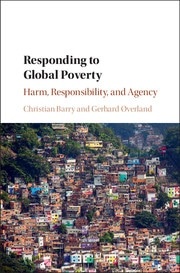 Responding to Global Poverty: Harm, Responsibility, and Agency, Christian Barry and Gerhard Øverland (Cambridge, U.K.: Cambridge University Press, 2016), 272 pp., $99.99 cloth.
Responding to Global Poverty: Harm, Responsibility, and Agency, Christian Barry and Gerhard Øverland (Cambridge, U.K.: Cambridge University Press, 2016), 272 pp., $99.99 cloth.
The modern literature on responding to global poverty is over fifty years old and has attracted the attention of some of the most prominent analytical political theorists of the age, including Brian Barry, Charles Beitz, Simon Caney, Thomas Pogge, John Rawls, and Peter Singer. Yet in spite of this extraordinary concentration of brainpower, the problem of global poverty has quite clearly not been solved or, indeed, adequately defined. We are therefore entitled to ask two questions of any new contribution to this literature: first, what does it have to offer that past work does not; and second, what reason is there to think that, this time, it will truly make a difference. These questions will be posed below, but before undertaking this task it may be useful to offer an overview of the field, with particular attention to why the problem of global poverty seems so intractable.
Full essay available to subscribers only. Click here for access.
More in this issue
Fall 2017 (31.3) • Review
Power Shift: On the New Global Order by Richard Falk
Richard Falk’s most recent book is full of interesting insights and displays an impressive degree of rhetorical power. Collectively, these essays demonstrate, rather convincingly, ...
Fall 2017 (31.3) • Review
When Norms Collide: Local Responses to Activism against Female Genital Mutilation and Early Marriage by Karisa Cloward
In this book, Karissa Cloward employs a mixed-methods study to examine the ways that local communities react to transnational activism and international norm promotion. In ...
Fall 2017 (31.3) • Feature
Rising Powers, Responsibility, and International Society
This article examines statements made by rising powers Brazil, China, and India in UN Security Council meetings between 2011 and 2016 to identify their perspectives on which ...